Andy Serkis And Terry Notary Talk 'War For The Planet Of The Apes'
While on the set of War for the Planet of the Apes, we chatted with Andy Serkis and Terry Notary, who play the performance capture Ape lead characters Caesar and Rocket. We learn about the set-up of this third Apes film, how the Apes have evolved through the series leading to this new confrontation, the struggle to get the Academy to recognize motion capture performances, the introduction of Steve Zahn as a Chimpanzee, the difference in the approach of acting for live-action vs. performance capture, and much more. Hit the jump to read our Terry Notary and Andy Serkis War For The Planet of the Apes interview.
Where is Caesar when we first meet him in this film?Serkis: Caesar at this point of his journey, if you remember where we left off at the last story, the apes had become divided under the leadership of Koba and he was carrying an enormous amount of guilt going against one of the primary tenets of their belief, which is that you shall not kill apes. He's killed the person who was his core [collaborator]. So two years have passed and the ALZ drug has continued to enable Caesar to develop. He's there now living in a situation where both apes and humans are at war and there's a sense that this is the crux, this is the climactic moment where both species are under huge threat and it's pretty apocalyptic. So they've weathered... both sides are worn out.
Caesar's side had to leave the encampment in the woods and lead them up higher in the hills and set up a temporary base. You'll remember Caesar as a character — one of his main characteristics, having been brought up with human beings, was to be empathetic to both sides but an event happens at the beginning of this movie that sets him off on a track that almost eats him up and he does set off on a revenge mission after this event happens without giving too much away. Through this story he goes through this incredible journey very much going to the dark heart of himself, probably the darkest he's ever encountered. This voyage of self destruction to the point where... And then again the set that we're on here is where he claws his way back from this very dark place through reconnecting with his tribe who have been holed up and taken prisoner here. So by the end he's able to redeem himself and to lead the exodus of the apes to freedom once more. So it's a fantastic journey.
An amazing arc that Matt [Reeves] and Mark Bomback have written. What they've managed to do each time with Dawn and then with this one is to amplify the stakes emotionally and scale-wise. It's very epic. It's on a massive scale not just because of its title... but because the stakes are just so much higher. And the global understanding... the apes find out there are other apes outside of the smaller group in Muir Woods who are evolving and changing and discovering how much the virus is effecting humanity and bringing them to... The virus is having a rebirth and is actually becoming much more aggressive and attacking the humans in another way too.
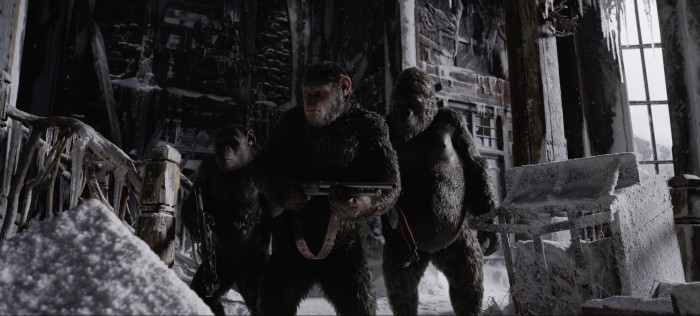 Where is Caesar physically and emotionally? Serkis: He's a wartime leader. He's bearing that weight at the beginning of the movie. Physically — he's much more upright, much more human like. He's continued to evolve linguistically. He's much more fluid. Caesar's... he becomes almost human like. If you remember in the last movie, the apes were discovering language. They were finding a prototype language and it was a combination of sign and ape vocalizations and the odd human word. For Caesar now, the human word becomes his primary form of expression.
Where is Caesar physically and emotionally? Serkis: He's a wartime leader. He's bearing that weight at the beginning of the movie. Physically — he's much more upright, much more human like. He's continued to evolve linguistically. He's much more fluid. Caesar's... he becomes almost human like. If you remember in the last movie, the apes were discovering language. They were finding a prototype language and it was a combination of sign and ape vocalizations and the odd human word. For Caesar now, the human word becomes his primary form of expression.
So that was a very big challenge for me personally in this movie in terms of charting the next version of Caesar – Caesar Part Three. It's interesting because we were looking at some pictures the other day, some photos of Rise and how much younger we all looked and how our bodies were far from trim and now we're all bent and twisted and out of shape. I think of this movie like 'Boyhood in the Jungle'. We've now come together all these times with all these changes for the character. There are moments that resonate back to the origin. Great moments that we've been able to play.
Terry: Yeah — that journey has been real for us as well – so we're carrying the journey of all three movies with us and it's influencing the characters.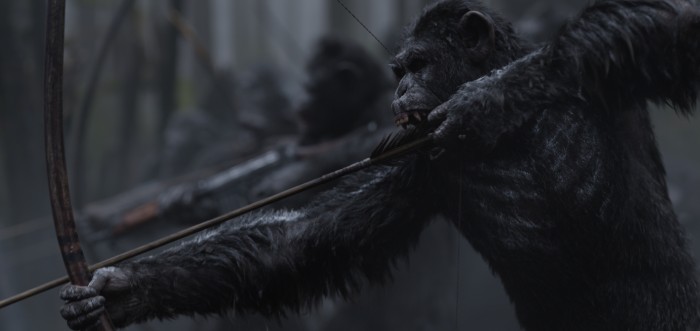 Are we going to question the apes' actions in the film?Serkis: We do know that further down the line we get to a point where the planet is dominated by apes. That doesn't happen in this movie and there's still room for that to develop. Again what Matt has done with the movie and what he and Mark have concocted and written is a very balanced world-view. It isn't judgmental either way. These two species are fighting for survival and it isn't necessarily picking a side despite the fact that it sees the world more emotionally from the ape's point of view. It still doesn't become black and white. The humans are not out and out villains. We all have lives and they are all equally valid.Terry: Like in Dawn, I think they did that well, giving the audience a chance to decide whom they liked and whom they didn't like and giving validity to both sides. The same is happening on this one.Serkis: I mean the stakes are higher this is a much darker, much more brutal, harder, tougher, very very brutal film. As brutal as you can get within a PG-13. Not in an overly graphic way but in its emotions and context. There's a real sense of foreboding in this movie.Terry: It's heavy.
Are we going to question the apes' actions in the film?Serkis: We do know that further down the line we get to a point where the planet is dominated by apes. That doesn't happen in this movie and there's still room for that to develop. Again what Matt has done with the movie and what he and Mark have concocted and written is a very balanced world-view. It isn't judgmental either way. These two species are fighting for survival and it isn't necessarily picking a side despite the fact that it sees the world more emotionally from the ape's point of view. It still doesn't become black and white. The humans are not out and out villains. We all have lives and they are all equally valid.Terry: Like in Dawn, I think they did that well, giving the audience a chance to decide whom they liked and whom they didn't like and giving validity to both sides. The same is happening on this one.Serkis: I mean the stakes are higher this is a much darker, much more brutal, harder, tougher, very very brutal film. As brutal as you can get within a PG-13. Not in an overly graphic way but in its emotions and context. There's a real sense of foreboding in this movie.Terry: It's heavy.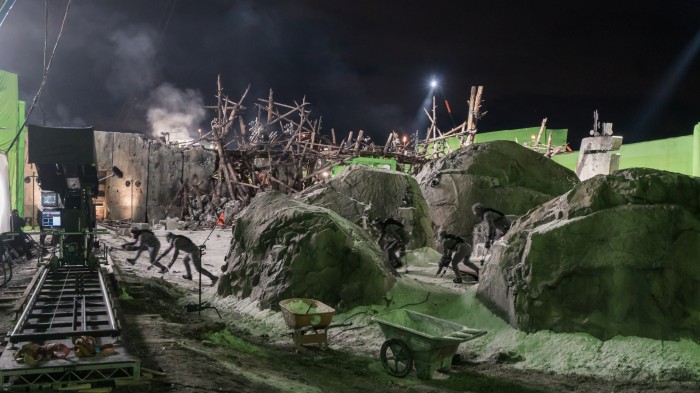 As the apes have grown and evolved, have you had to adjust your choreography and movements?Terry: Yep — we are. Every film seems to have a little bit more of that. That human consciousness and awareness of the self and the battle between the instinct driven ape and the conscious awareness, the tether that holds the primal instinct at bay. It's that balance where before it was eighty-twenty primal consciousness, now it's starting to balance itself out. That influences the movement as well. They're much more up right. Just the way they articulate. It's going from the first film – we're really in it being eighty percent ape to now where it's pushing the consciousness forward. That influences everything.Drawing a Clint Eastwood comparison, we saw some concept art of Caesar on his horse — what is Caesar's relationship to the horse and is he aware of the irony in subjugating an animal to his will?Serkis: It's an interesting question.Terry: We brought that up.Serkis: There is a sense that as animals they are working together. Caesar as a character would never... you get humans who treat horses with respect and humans who treat them as work animals and treat them badly. Caesar is much more [humane] with his horse.Terry: We were trying to find a nice spot in the film where we could have a moment where the apes were connecting in a way that was different than the way a human would connect with a horse. It was almost this animal to animal synergy and this wordless way to communicate. This connection that they had. The ways they go under them and come up and have a little moment. We were trying to have a piece there for that – so people go oh okay this is a different relationship than commanding an animal to take you from A to B.Serkis: It's interesting as well because we're working with the most amazing wrangler. [Danny Virtue?] is a real horse-whisperer. He's an extraordinary human being who has taught us so much about respect and working with these horses. It's a real art what he's doing. Such subtle things, such subtle movements and subtle changes and just a way of being – the way his horses have grown up with him. They're really connected.Terry: They're not afraid. They're not fear driven. They're reward driven so that helps with the relationships we have with the horse. It feels like a team rather than something that's doing something because they're going to get whipped or kicked.
As the apes have grown and evolved, have you had to adjust your choreography and movements?Terry: Yep — we are. Every film seems to have a little bit more of that. That human consciousness and awareness of the self and the battle between the instinct driven ape and the conscious awareness, the tether that holds the primal instinct at bay. It's that balance where before it was eighty-twenty primal consciousness, now it's starting to balance itself out. That influences the movement as well. They're much more up right. Just the way they articulate. It's going from the first film – we're really in it being eighty percent ape to now where it's pushing the consciousness forward. That influences everything.Drawing a Clint Eastwood comparison, we saw some concept art of Caesar on his horse — what is Caesar's relationship to the horse and is he aware of the irony in subjugating an animal to his will?Serkis: It's an interesting question.Terry: We brought that up.Serkis: There is a sense that as animals they are working together. Caesar as a character would never... you get humans who treat horses with respect and humans who treat them as work animals and treat them badly. Caesar is much more [humane] with his horse.Terry: We were trying to find a nice spot in the film where we could have a moment where the apes were connecting in a way that was different than the way a human would connect with a horse. It was almost this animal to animal synergy and this wordless way to communicate. This connection that they had. The ways they go under them and come up and have a little moment. We were trying to have a piece there for that – so people go oh okay this is a different relationship than commanding an animal to take you from A to B.Serkis: It's interesting as well because we're working with the most amazing wrangler. [Danny Virtue?] is a real horse-whisperer. He's an extraordinary human being who has taught us so much about respect and working with these horses. It's a real art what he's doing. Such subtle things, such subtle movements and subtle changes and just a way of being – the way his horses have grown up with him. They're really connected.Terry: They're not afraid. They're not fear driven. They're reward driven so that helps with the relationships we have with the horse. It feels like a team rather than something that's doing something because they're going to get whipped or kicked.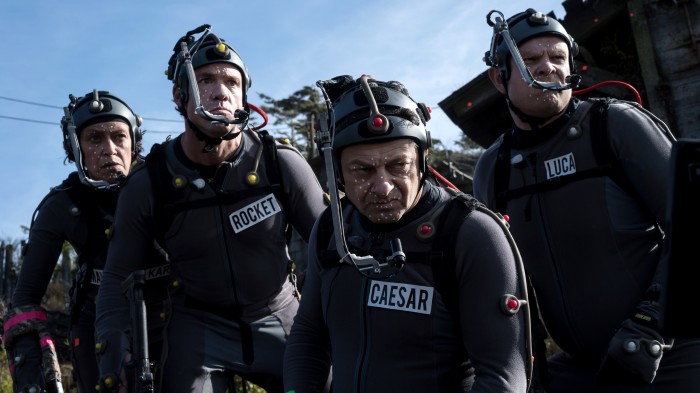 [Any awards thought?] Where do you see Mo-cap going in terms of Oscars? Do they need a new category?Serkis: Absolutely not. But the matter is – we are actors playing roles and they happen to be in this instance apes but there's no difference. In the scenes that we're playing, if we were to block out the scenes as actors in costumes, it would be no different. The process is no different. The process of acting is no different. You're embodying the character. You're creating the psychology and the physicality. You're living the moment.Terry: It's a different form of costume. That's all it is.Serkis: Of course there's this whole grey area seemingly every time it's talked about animators and who takes ultimate responsibility for the characters but without question and I'll go down saying this year after year, these characters are authored by what we do on set. They are not authored by animators. Animators do amazing working translating and interpolating the characters, the facial performances. What we're creating on set — if you don't get it on the day, in the moment, on set, in front of the camera, with the director and the actors. The emotional content of the scene and the acting choices. If they are not there on the day, they will never be in the movie. So that is really important to understand. It is understood. There are now great A-list actors who are using performance capture because they realize there is... Mark Rylance on BFG... I just directed The Jungle Book with Cate Blanchet and Christian Bale...Terry: I think we're going to look back and in ten years, you're going to go what were you thinking. What they need to do is a side by side. You see Andy's performance without the translation of the ape and you go oh my god – if only the ape could be as good as him. If anything – I think the challenge is for the animator to capture the... to be able to translate all of the amazing things that are happening, and having had the privilege to work with Andy and be in scenes with him, I'm so blown away by his performance with this character. It's mind-blowing. He should be nominated for an Oscar. I think he should've won last year.Could your roles in the franchise extend beyond just playing Rocket and Caesar?Serkis: Absolutely. There is always that potential in the same way — Roddy McDowall ended up playing Cornelius to Caesar. Two different characters. That's the joy of the craft. Bring it on I say.Could you discuss the addition of Steve Zahn and training him as an ape?Serkis: It's an interesting one because in a sense I've left that behind in the same way that Caesar has moved on from being an ape. When I first was offered the role on Rise, I always played Caesar as a human being within ape skin. Rather than something like King Kong where I really went after studying gorillas in the wild and captivity. I based him on a real chimpanzee and I worked with Terry on a lot of chimpanzee movement; but it was always with an underlying notion that because he was brought up with human beings and because of the drug he had pretty much grown up with his whole life, he felt like an outsider, he felt trapped in an ape's body but he didn't really feel like an ape and that was my way into the character. So he's always had this duality playing him from an infant all the way to now as a fifty-five year old ape.
[Any awards thought?] Where do you see Mo-cap going in terms of Oscars? Do they need a new category?Serkis: Absolutely not. But the matter is – we are actors playing roles and they happen to be in this instance apes but there's no difference. In the scenes that we're playing, if we were to block out the scenes as actors in costumes, it would be no different. The process is no different. The process of acting is no different. You're embodying the character. You're creating the psychology and the physicality. You're living the moment.Terry: It's a different form of costume. That's all it is.Serkis: Of course there's this whole grey area seemingly every time it's talked about animators and who takes ultimate responsibility for the characters but without question and I'll go down saying this year after year, these characters are authored by what we do on set. They are not authored by animators. Animators do amazing working translating and interpolating the characters, the facial performances. What we're creating on set — if you don't get it on the day, in the moment, on set, in front of the camera, with the director and the actors. The emotional content of the scene and the acting choices. If they are not there on the day, they will never be in the movie. So that is really important to understand. It is understood. There are now great A-list actors who are using performance capture because they realize there is... Mark Rylance on BFG... I just directed The Jungle Book with Cate Blanchet and Christian Bale...Terry: I think we're going to look back and in ten years, you're going to go what were you thinking. What they need to do is a side by side. You see Andy's performance without the translation of the ape and you go oh my god – if only the ape could be as good as him. If anything – I think the challenge is for the animator to capture the... to be able to translate all of the amazing things that are happening, and having had the privilege to work with Andy and be in scenes with him, I'm so blown away by his performance with this character. It's mind-blowing. He should be nominated for an Oscar. I think he should've won last year.Could your roles in the franchise extend beyond just playing Rocket and Caesar?Serkis: Absolutely. There is always that potential in the same way — Roddy McDowall ended up playing Cornelius to Caesar. Two different characters. That's the joy of the craft. Bring it on I say.Could you discuss the addition of Steve Zahn and training him as an ape?Serkis: It's an interesting one because in a sense I've left that behind in the same way that Caesar has moved on from being an ape. When I first was offered the role on Rise, I always played Caesar as a human being within ape skin. Rather than something like King Kong where I really went after studying gorillas in the wild and captivity. I based him on a real chimpanzee and I worked with Terry on a lot of chimpanzee movement; but it was always with an underlying notion that because he was brought up with human beings and because of the drug he had pretty much grown up with his whole life, he felt like an outsider, he felt trapped in an ape's body but he didn't really feel like an ape and that was my way into the character. So he's always had this duality playing him from an infant all the way to now as a fifty-five year old ape.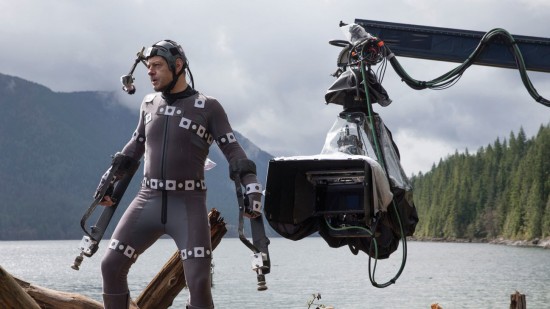 As someone who mentors people in motion capture, does that influence how you play Caesar as a leader? Can you identify with him more?Serkis: Certainly - Caesar would make a reasonably good film director because he's a collaborator and he listens to other people's opinions and values good ideas. So yes — in that respect he is. I have learned from the character. There's no question. You go do these things and think you're defining the character but actually it's the character that defines you in some respects. When you come out of the other end of a long process, working with a character [you realize] this character has really shaped my ideas.Terry: it's happened for me. I've learned more about myself through this character than through anything else that I have done. Rocket has taught me about myself. It's about shedding all the BS and really looking at yourself for real and anytime something fake comes up it's like blehh. It feels like vomit. So it's good. You get it out of your system, all this crap comes out. And you're like I'm not doing that again. Throw that out. You find out that was that guck that wasn't real, that needed to come out. So it's a really freeing process for me... As Rocket evolves, I feel like I'm evolving as a human being through this character. it's profound but it's true but it's really amazing.
As someone who mentors people in motion capture, does that influence how you play Caesar as a leader? Can you identify with him more?Serkis: Certainly - Caesar would make a reasonably good film director because he's a collaborator and he listens to other people's opinions and values good ideas. So yes — in that respect he is. I have learned from the character. There's no question. You go do these things and think you're defining the character but actually it's the character that defines you in some respects. When you come out of the other end of a long process, working with a character [you realize] this character has really shaped my ideas.Terry: it's happened for me. I've learned more about myself through this character than through anything else that I have done. Rocket has taught me about myself. It's about shedding all the BS and really looking at yourself for real and anytime something fake comes up it's like blehh. It feels like vomit. So it's good. You get it out of your system, all this crap comes out. And you're like I'm not doing that again. Throw that out. You find out that was that guck that wasn't real, that needed to come out. So it's a really freeing process for me... As Rocket evolves, I feel like I'm evolving as a human being through this character. it's profound but it's true but it's really amazing.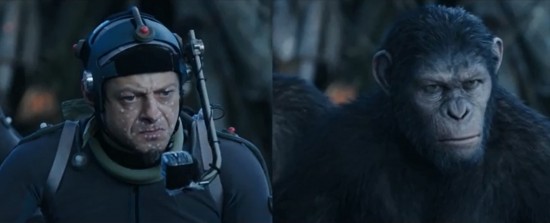 Is it strange that people don't recognize you?Serkis: No I like it that way. It's funny – there are days when I can walk around and no one knows me from Adam. And then there are days where people do recognize me. it's a weird thing with acting and it happens to a lot of actors, not just myself — it's like you're giving off an I really need to be loved today vibe. My worst moment recently is I fell asleep on the tube in London on the Victoria line 8:30 in the morning and I woke up and there were about five people with iPhones taking pictures.
Is it strange that people don't recognize you?Serkis: No I like it that way. It's funny – there are days when I can walk around and no one knows me from Adam. And then there are days where people do recognize me. it's a weird thing with acting and it happens to a lot of actors, not just myself — it's like you're giving off an I really need to be loved today vibe. My worst moment recently is I fell asleep on the tube in London on the Victoria line 8:30 in the morning and I woke up and there were about five people with iPhones taking pictures.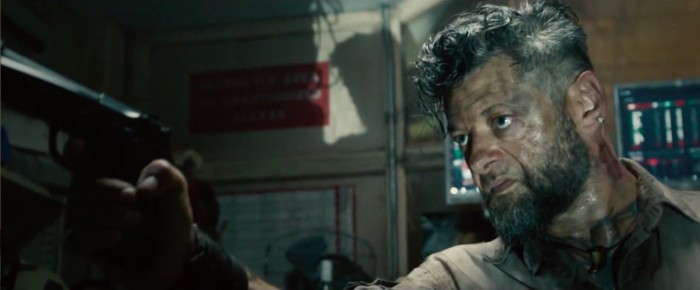 What is it like switching between live action and mo-cap? Is the approach different?Serkis: No you don't approach them differently. You don't go – oh this is a motion capture role, I'm going to employ this method of acting. We don't have anything to hide behind when we're doing this. There's no...Terry: It comes from inside. Rather than putting a costume on and going now I have my shell and I've got my costume, the costume comes from the inside out. You're basically naked in this outfit. You don't go oh I have my fur on and my mask, you're creating the character from the inside out.Serkis: Stripping away. Where as you go into playing something like Ulysses [on Black Panther], you go – I'm going to have this haircut and this cloth, you draw from different stimulus.
What is it like switching between live action and mo-cap? Is the approach different?Serkis: No you don't approach them differently. You don't go – oh this is a motion capture role, I'm going to employ this method of acting. We don't have anything to hide behind when we're doing this. There's no...Terry: It comes from inside. Rather than putting a costume on and going now I have my shell and I've got my costume, the costume comes from the inside out. You're basically naked in this outfit. You don't go oh I have my fur on and my mask, you're creating the character from the inside out.Serkis: Stripping away. Where as you go into playing something like Ulysses [on Black Panther], you go – I'm going to have this haircut and this cloth, you draw from different stimulus.
